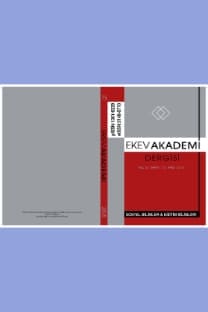AN ANALYSIS OF MASTER’S AND DOCTORAL RESEARCH ON FLIPPED INSTRUCTION IN TURKEY
Flipped learning has been one of the most popular trends in education in the last decade. History of flipped learning dates back to 2007 when two chemistry teachers in the USA recorded videos and screencast them for enabling their students to compensate for the lessons they missed. Flipped learning emphasizes effective use of class time by changing the traditional task of teachers and students inside and outside the classroom. In flipped learning, students' roles as passive lecture listeners change to active participants in classroom activities. As its name suggests, flipping takes the presentation or lecture part which is traditionally done in the classroom and places that in pre-class work. It can be considered as a pedagogical model in which the typical lecture and homework elements of a course are reversed. Subsequent to the first implementation of this new instructional model, a lot of institutions have started to integrate the model into their education systems and research on flipped learning has begun to gain popularity. This study aims to analyse master’s and doctoral research on flipped learning conducted in Turkey. As data collection tool, document analysis method was used in the study. To this end, some key words related to flipped learning were searched in the data base of National Thesis Center (NTC) provided by the Council of Higher Education. It was found that 57 master’s and 31 doctoral research was conducted in different disciplines between the years of 2014 and 2019 in Turkey. The scope of majority of these studies was usually based on determining students’ attitudes, perceptions, academic achievements, and selfefficacy beliefs. Some studies focused on the contribution of flipped learning to learners’ development of 21st century skills as well as to general competence levels. The study also found that flipped learning was implemented in a wide range of disciplines such as history, chemistry, music, science education, social studies, accounting education, medical studies, and foreign language education which constituted the greatest proportion of the current academic research in Turkey.
Anahtar Kelimeler:
Flipped Learning, Master, Doctoral Studies, Academic Research, Dissertations.
___
- Akçor, G. (2018). Exploring the perceptions of pre-service English language teachers of flipped classroom (Master's thesis). Retreived from https://tez.yok.gov.tr/ UlusalTezMerkezi/giris.jsp
- Bowen, G. A. (2009). Document analysis as a qualitative research method. Qualitative research journal, 9(2), 27-40.
- Çarpıcı, S. S. (2018) An investigation into the influence of flipped classroom model on academic achievement in English lessons (Master's thesis). Retreived from https://tez.yok.gov.tr/UlusalTezMerkezi/giris.jsp
- Ekmekçi, E. (2014). Flipped writing class model with a focus on blended learning (Doctoral Dissertation). Retreived from https://tez.yok.gov.tr/UlusalTezMerkezi/ giris.jsp
- Erbil, D. G. (2019). Tersine çevrilmiş sınıf ortamında işbirlikli öğrenme yönteminin akademik başarı ve psikososyal değişkenler üzerindeki etkisi (Doktora Tezi). Retreived from https://tez.yok.gov.tr/UlusalTezMerkezi/giris.jsp
- Filiz, O. (2018). The effect of teacher candidates’ experiences in the flipped learning environments to the educational technology standards self-efficacy, innovativeness level and online engagement (Doktoral Dissertation). Retreived from https://tez. yok.gov.tr/UlusalTezMerkezi/giris.jsp
- Flipped Learning Network (FLN). (2014) The Four Pillars of F-L-I-PTM Reproducible PDF can be found at www.flippedlearning.org/definition.
- İyitoğlu, O. (2018). The impact of flipped classroom model on EFL learners’ academic achievement, attitudes and self-efficacy beliefs: A mixed method study. (Doktoral Dissertation). Retreived from https://tez.yok.gov.tr/UlusalTezMerkezi/giris.jsp
- Kansızoğlu, H. B. (2018). The effect of flipped classroom model-based writing teaching on metacognitive awareness level, writing success and writing anxiety of students (Doktoral Dissertation). Retreived from https://tez.yok.gov.tr/UlusalTezMerkezi/ giris.jsp
- Kaptanoğlu, Ş. N. (2018) Tersyüz sınıf modeline dayalı çevrimiçi infertiliteyi önleme eğitiminin üniversite öğrencilerinin infertilite konusundaki bilgi, tutum ve ders motivasyonuna etkisi (Yüksek Lisans Tezi). Retreived from https://tez.yok.gov. tr/UlusalTezMerkezi/giris.jsp
- Karakurt, L. (2018). Flipped and blended grammar instruction for b1 level efl classes at tertiary education (Master's thesis). Retreived from https://tez.yok.gov.tr/ UlusalTezMerkezi/giris.jsp
- Kozikoglu, I. (2019). Analysis of the Studies Concerning Flipped Learning Model: A Comparative Meta-Synthesis Study. International Journal of Instruction, 12(1), 851-868.
- Özdemir, A. (2016). Ortaokul matematik öğretiminde harmanlanmış öğrenme odaklı ters yüz sınıf modeli uygulaması (Doktora Tezi). Retreived from https://tez.yok.gov. tr/UlusalTezMerkezi/giris.jsp
- Turan, Z. (2015). The evaluation of flipped classroom method and examination of its effects on academic achievement, cognitive load and motivation. (Doktoral Dissertation). Retreived from https://tez.yok.gov.tr/UlusalTezMerkezi/giris.jsp
- Turan, Z., & Akdag-Cimen, B. (2019). Flipped classroom in English language teaching: a systematic review. Computer Assisted Language Learning, 1-17.
- Tütüncü, N., & Aksu, M. (2018). A systematic review of flipped classroom studies in Turkish education. International Journal of Social Sciences and Education Research, 4(2), 207-229.
- Yurdagül, C. (2018). The effect of flipped classroom as a teaching strategy on undergraduate students’ self-efficacy, engagement and attitude in a computer programming course (Doktoral Dissertation). Retreived from https://tez.yok. gov.tr/UlusalTezMerkezi/giris.jsp
- ISSN: 1301-6229
- Yayın Aralığı: Yılda 4 Sayı
- Başlangıç: 1996
- Yayıncı: ERZURUM KÜLTÜR VE EĞİTİM VAKFI
Sayıdaki Diğer Makaleler
BÂKILLÂNÎ’NİN (Ö. 403/1013) İ‘CÂZ ANLAYIŞI
YESEVÎLİK’TE TOPLU ZİKİRLERE KADINLARIN İŞTİRAKİ İDDİALARI ÜZERİNE DEĞERLENDİRMELER
ÖĞRETMEN ADAYLARININ SOSYAL GİRİŞİMCİLİK ÖZELLİKLERİNİN FARKLI DEĞİŞKENLER AÇISINDAN İNCELENMESİ
İNŞAAT SEKTÖRÜ, FAİZ ORANI VE EKONOMİK BÜYÜME İLİŞKİSİNİN ANALİZİ: TÜRKİYE ÖRNEĞİ (2002-2019)
SERKAN GÖKSU, Mehmet Alper ŞEN, Süleyman GÜCEK
ARAP DİLİNDE MANANIN MORFOLOJİK ETKİSİ ÜZERİNE
POLİTİK SEÇİM TARİHLERİ ETRAFINDA ANORMAL GETİRİ HAREKETLERİ: BORSA İSTANBUL ÖRNEĞİ
PROJE KAPSAMINDA OLAN VE OLMAYAN AİHL’LERİN ETKİLİ OKUL ÖZELLİKLERİNİN KARŞILAŞTIRMALI İNCELENMESİ
